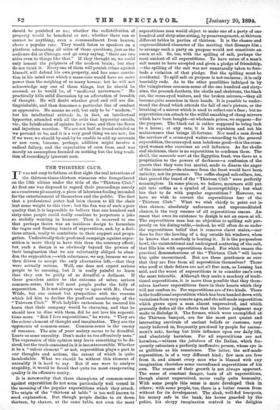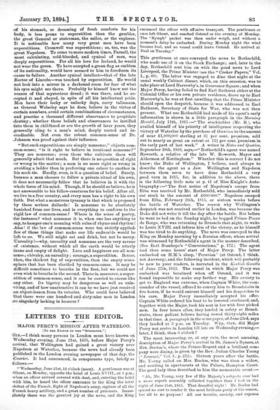THE THIRTEEN CLUB.
IT was not easy to fathom at first sight the real intentions of the thirteen-times-thirteen wiseacres who foregathered on the 13th ultimo under the title of the "Thirteen Club." At first one was disposed to regard their proceedings merely as a cumbrous pleasantry, a piece of laborious fooling intended for the entertainment of themselves and the public. The fact that a professional jester had been chosen to fill the chair lent some weight to this view; but the fun was of such a poor quality that it is impossible to believe that one hundred and sixty-nine people could really combine to perpetrate a joke so stolidly wanting in humour. Then it occurred to one that perhaps theirs was an insidious design to formulate the vague and floating tenets of superstition, and, by a ficti- tious attack, really to contribute to their support and propa- gation. Undoubtedly their professed campaign against super- stition is more likely to have this than the contrary effect; but such a design is so obviously beyond the powers of their imagination that we are reluctantly obliged to aban- don the supposition ;—with reluctance, we say, because we are then driven to accept the only alternative left,—that they were actually serious. Well, one does not expect serious people to be amusing, but it is really painful to learn that they can be guilty of so dreadful a dullness. If these graceless antics be the outcome of sober, serious common-sense, then will most people prefer the folly of superstition. It is not always easy to agree with Mr. Oscar Wilde, but one cannot but sympathise with the reasons which led him to decline the proffered membership of the "Thirteen Club." With ladylike enthusiasm he assured his hosts that their company would be charming, and that he should love to dine with them, did he not love his supersti- tions more. "But I love superstitions," he wrote. "They are the colour element of thought and imagination. They are the opponents of common-sense. Common-sense is the enemy of romance. The aim of your society seems to be dreadful. Leave us some unreality. Don't make us too offensively sane." The expression of this opinion may leave something to be de- sired, but the truth contained in it is incontrovertible. Whether it be a "colour element" or not, superstition plays a part in our thoughts and actions, the extent of which is quite incalculable. What we should be without this element of unreality it is hard to say. Bat if one were to analyse stupidity, it would be found that quite its most exasperating quality is its offensive sanity.
It is noteworthy that these champions of common-sense
against superstition do not seem particularly well versed in
the meaning of the popular superstitions which they attack. The origin of the "thirteen at table" is too Well known to need explanation. But though people dislike to sit down thirteen, by chance, at the same table, not even the most
superstitious man would object to make one of a party of one hundred and sixty-nine sitting, by prearrangement, at thirteen different tables in parties of thirteen. It is the chew* and unpremeditated character of the meeting that dismays him to arrange such a party on purpose would not constitute an omen at all. So, too, with the spilling of salt, perhaps the most ancient of all superstitions. To have eaten of a man's salt meant to have accepted and given a pledge of friendship,. —the spilling of the salt was not unnaturally taken to fore- bode a violation of that pledge. But the spilling must be- accidental. To spill salt on purpose is not ominous; it is only boorishly rude. As to the other puerilities indulged in by the vainglorious common-sense of the one hundred and sixty- nine, the peacock-feathers, the skulls and skeletons, the black cat, the cross-eyed waiters, and the broken mirrors,—they all become quite senseless in their hands. It is possible to under- stand the dread which attends the fall of one's picture, or the breaking of a mirror which is used to reflect one's face; but no superstition can attach to the wilful smashing of cheap mirrors- which have been bought—at wholesale prices, we suppose—for- the purpose. The black cat is rather supposed to bring luck to a house; at any rate, it is his expulsion and not his- maintenance that brings ill-fortune. Nor need a man dread( the services of a cross-eyed waiter—according to the general superstition, the cross-eyed man betokens good—it is the cross- eyed woman who exercises an evil influence. As for skulls. and skeletons, there is no superstition to condemn them. The- skull, the memento mori at the Egyptian feast, Was there as a propitiation to the powers of darkness—a confession of the- guests that they were but mortal, made to disarm the anger- of the immortals—its absence from the feast would have been unlucky, not its presence. The coffin-shaped salt-cellars, too,. that graced the board of the "Thirteen Club" were perfectly meaningless. In some places, we believe, mourners still put- salt into coffins as a symbol of :incorruptibility ; but what. has that to do with popular superstition ? However, we have no wish to correct the superstitions lore of the- "Thirteen Club." What we wish chiefly to point out that chance, absolutely unforeseen and unpremeditated chance, is the very essence of all superstitious omens. An omen that owes its existence to desigh is not an omen at alL. The superstitious man has no objection to spilling salt pur- posely on his dining-table,—indeed, he will often do so under- the superstitious belief that it removes claret stains,—nor does he fear the howling of a dog outside his windows, when he knows that somebody is beating it. It is the purposeless- howl, the unintentional and undesigned scattering of the salt, that fills him with superstitious dread. For which reason the practical demonstrations of the "Thirteen Club" will leave him quite unconvinced. But are these gentlemen so sure- that they are free from all superstition themselves? Those- who scoff at their fetters are not all free men, as Lessing has. said, and the worst of superstitions is to consider one's own the most tolerable. Although they make a mockery. of tradi- tional superstitions, it is more than possible that they them- selves harbour superstitious fears in their hearts which they will not confess to. For superstitions are of two kinds. There- is the traditional superstition which has been handed down with. variations from very remote ages, and the self-made superstition which grows upon a man almost unperceived, and which. generally defies all the efforts that his better judgment may- make to dislodge it. The former, which were exemplified at. the Thirteen banquet, are for the most part quaint and interesting survivals of ancient beliefs or customs, very rarely believed in, frequently practised by people for amuse- ment's sake, having but little influence upon our daily life, and absolutely harmless. For all superstitions are not harmless,—witness the jettatura of the Italian, which fre- quently ostracises a perfectly inoffensive person, whose eye is as guiltless as his conscience. The latter, the self-made superstition, is of a very different kind ; few men are free from it, and almost every man who is blessed with any imagination cherishes some unconfessed superstitions of his own. The reason of their growth is not always apparent.. The sense of constant danger, basis of all superstitions, though almost unperceived, never really quits humanity.
With some people this sense is more developed than
others; with some people, too, there is a better reason from without for its development. The sleek, well-fed bourgeois' his money safe in the bank, his house guarded by the police, his sleepy imagination centred in the delights of his stomach, or dreaming of fresh comforts for his body, is less prone to superstition than the gambler, the great General or statesman, the sailor, or the explorer. It is noticeable how many very great men have been superstitious. Cromwell was superstitious ; so, too, was the great Napoleon. To come to more modern times, Parnell, the most calculating, cold-blooded, and cynical of men, was =deeply superstitious. For all his love for Ireland, he would tot wear the green. To have accepted a green flag as emblem -of its nationality, would have seemed to him to foredoom its -cause to failure. Another cynical intellect—that of the late Rector of Lincoln—was touched by superstition. He would anot look into a mirror in a darkened room for fear of what bis eyes might see there. Probably he himself knew not the reason of that mysterious dread ; it was there, and he ac- oepted it and obeyed, in spite of all his intellectual pride. Men have their lucky or unlucky days, carry talismans, as General Wolseley says he does, believe in the virtue of .certain numbers, avoid certain combinations of circumstances, and practise a thousand different observances to propitiate destiny; whether these beliefs and observances be instilled into them in childhood or are the growth of later years, they ,generally cling to a man's mind, deeply rooted and in- .eradicable. Not even the robust common-sense of Dr. Johnson was proof against their influence.
"Bat such superstitions are simply nonsense," objects com- 4non-sense; "is it right to believe in irrational nonsense?" 'They are nonsense; even those who cultivate them will generally admit that much. But there is no question of right -or wrong in the matter ; a man is no more right or wrong in avoiding a ladder than in preferring one colour to another in dais neck=tie. Hardly, even, is it a question of belief. Surely, became a man chooses to follow a private ritual of his own, it does not necessarily follow that he believes in it with the whole force of his mind. Though, if he should so believe, he is not answerable to his fellow-creatures for his belief. After all, ..cve live in a free country, and every man has a right to his own -faith. But what a monstrous tyranny is that which is proposed by these serious dullards ! Is nonsense to be absolutely banished from our lives, and is everything to conform to the rigid law of common-sense ? Where is the sense of poetry, for instance? what nonsense it is, when one has anything to =say, to hamper one's meaning with rules of rhyme and rhythm! Alas ! if the law of common-sense were too strictly applied, few of those things that make our life endurable would be (left to us. We still might eat and drink, but not be merry. Unrealityl—why, unreality and nonsense are the very savour -of existence, without which all the earth would be utterly inane and empty of delight. Love and happiness are all non- 'sense; chivalry, an unreality ; courage, a superstition. Better, then, the thickest fog of superstition, than the empty atmo- =sphere that has been clarified by common-sense. It may be difficult sometimes to breathe in the first, but we could not -even wish to breathe in the second. There is, moreover, a super- atition of common-sense, and it can be carried to excess like any other. Its bigotry may be dangerous as well as unin- oviting, and of how unattractive it can be we have just received an object-lesson from its votaries. Who could have believed that there were one hundred and sixty-nine men in London ,so singularly lacking in humour ?



































 Previous page
Previous page